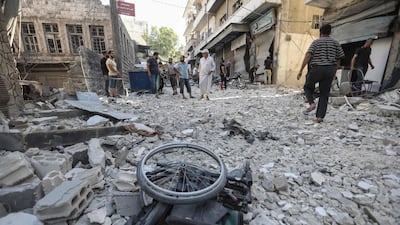Close to half a million people in Syria have been displaced from their homes in the past three months, refugees in the making, who would have sought safety with their neighbours across the border if the doors hadn’t been shut in their faces.
Let that number sink in for a moment. Half a million rendered homeless, running for their lives. They fled rebel-held areas in the provinces of Idlib and Hama between April and July, trying to escape death at the hands of militias loyal to Bashar Al Assad or Russian fighter jets.
Entire cities emptied of their inhabitants, ghost towns where homes, schools, playgrounds will soon be razed.
The Assad regime’s campaign to reclaim Idlib, the last province under rebel control, is now in its fourth month. Over the past three years, the regime clawed back much of the country in a series of scorched-earth campaigns that led to thousands of civilian deaths and incalculable destruction, backed by the Russian air force and pro-Iranian militias.
Other than territories in the north, under the control of Turkish proxies, and former ISIS areas in the north-east, controlled by the Americans and their Kurdish paramilitary allies, Idlib is still outside the government's remit. Home to hundreds of thousands of refugees from other parts of Syria, it has fallen under the tyrannical rule of extremists once affiliated with Al Qaeda.
Assad's forces have yet to achieve any major advances in Idlib, but have continued to wreak wanton death and destruction. The absence of international action, or even the bare minimum outcry, is indicative of the level of war crimes and breach of norms we have come to tolerate as an international community.
It is necessary to take stock of the carnage up until now, to illustrate what we have grown accustomed to – the level of violence that we now find acceptable.
So far, according to the UN Office for the Co-ordination of Humanitarian Affairs, around 452,000 people have been forced to flee their homes due to the violence, which began in April, crowding into refugee camps or sleeping rough in the scorching summer heat. Nearly three million now live in Idlib, and the level of destitution is compounded by the fact that most of them have been displaced before – and not once or twice. Some have had to move up to a staggering 10 times to flee the violence.
The actual number of people who have died as of mid-July is 450, a tally that increases daily with the repeated bombing of civilians. Last Monday, 60 people died in a single day of violence that included air strikes on a market in the city of Maarat Al Numan – the residents of which have long bravely demonstrated against both Assad and the extremists who control the region – in which 39 died, including many women and children.
Since the beginning of July, hospitals supported by the Syrian-American Medical Society have treated 1,250 wounded civilians, including 188 children. Children make up more than half of Idlib’s civilians. The regime claims that its campaign of assaults against the province are meant to eradicate terrorism.
The brutality was encapsulated in a viral image from the city of Ariha last week, in which a father stood atop the rubble of his home, calling out to his two young daughters who teetered on the edge. The father, Amjad Al Abdullah, survived the attack, as did his two daughters, five-year-old Rawan and her baby sister Tuka. But the girls' mother, Asmaa, 25, and another daughter, Reham, died in the bombardment.
There was a time when viral images from Syria, such as those of Alan Kurdi, the young boy who drowned trying to reach Greece, would at least spark awareness of the humanitarian crisis engulfing the country. That is in the past. We can now absorb those images, like so many others, and go on with our day.
Since April, at least 39 separate attacks against hospitals and clinics were carried out by the regime and its allies, killing and wounding rescue workers, medical staff and civilians, according to UN figures. Video evidence has repeatedly shown that the regime is carrying out so-called "double-tap" strikes, hitting an area and then proceeding to hit it again after rescue workers arrive, a de facto war crime. But, what is that next to a total of 573 attacks since March 2011 and the death of 890 medical personnel over the course of the war, according to figures from Physicians for Human Rights? Attacks on hospitals in Syria have become so normal that they no longer stand out.
But they are not the only crimes to which we have become inured. At least 50 schools have been damaged or destroyed by shelling and bombing so far in the Idlib offensive, and in July alone, the UN has documented attacks on three camps for the displaced, five bakeries, three markets, two mosques, three water stations, an ambulance and eight hospitals and clinics. It is a systematic programme of atrocity concocted only by those who fear no retribution or condemnation, confident that the world has tired of hearing about the suffering of innocent Syrians.
Each of these attacks, given the regime’s history of indiscriminate bombing, probably constitutes a war crime. The deliberate targeting of civilians and hospitals makes them likely to fall into the category of crimes against humanity. As the endgame approaches, the Assad regime is simply piling one outrage on top of another.
Under any international charter and any semblance of an international order rooted in decency and justice, the perpetrators of these crimes would be held accountable, their punishment held up as an example to those who would transgress these basic and fundamental moral boundaries. But we do not live in such a world. In the face of mounting horror, we have simply turned away.


